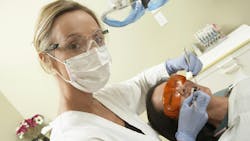Should dentists be performing dental hygiene?
According to an October 2023 poll from the ADA Health Policy Institute (HPI), 49.7% of dentists responding report they have taken on more hygienist, assistant, or admin duties in the past few years. And with 77% of those respondents noting it’s been “extremely challenging” to recruit dental hygienists, it might mean that those preventive appointments aren’t happening in the hygiene chair.
Should dentists be doing hygiene?
It is undoubtedly within a dentist’s scope of practice to perform prophys, periodontal maintenance, and nonsurgical periodontal therapy, but it seems as though the experience they get in dental school varies greatly. Dental students are tasked to learn fillings, crown and bridge, extractions, root canals, removables, and more; preventive therapies are somewhere in the mix, with varying emphasis.
On the other hand, dental hygiene students spend all of their clinical time (albeit less than dentists spend overall) focused on preventive maintenance and nonsurgical therapies. While their clinical requirements also differ per school, there are fewer procedures to master before graduation. One could argue that a dental hygienist has more expertise in disease prevention since it’s their main focus in school.
Do what you have to do, but do it well
But expertise won’t help you if you can’t fill a vacancy. The US Bureau of Labor Statistics has been estimating since at least 2019 that the job outlook growth for hygienists is growing faster than average. And the 2024 Dental Salary Report found that 35% of hygienists plan to retire in the next six years. This means that unless we start graduating more hygienists, this stressor won’t go anywhere.
Patients still need preventive care, and that might, out of necessity (or choice), fall into the dentist's column. As with any procedure, if dentists are going to perform it, they better know how to do it! (And if you’re a dentist who’s right now rolling your eyes, saying it’s just cleaning teeth, step away from the scaler….)
There are many steps to a proper preventive maintenance visit, and none of them should be skipped, regardless of what chair the patient is in. When it comes to instrumentation, a healthy prophy is a breeze, but a patient with active periodontal disease and significant clinical attachment loss is another story. If navigating furcations, deep pockets, or burnished calculus has you reaching for a universal instrument, take an advanced instrumentation course, watch some videos from Hygiene Edge, or ask a hygienist for some tips.
Hygienist hiring hack
In fact, reaching out to a hygienist for help with delivering excellent care could land you the new hire you’ve been looking for. Showing an RDH how much you value and respect their work can make a huge shift in your office's reputation. While you’re at it, ensure your office has sharp, quality instruments and good equipment in order to deliver quality care. Just because it’s a universal instrument doesn’t mean it will get into every pocket. Patients with periodontal disease need area-specific instruments and more than one type of ultrasonic tip to receive comprehensive care. And just like your burs, they wear out and need to be replaced.
Work to the top of your license
From a business perspective, it might not make sense for dentists to do hygiene. HPI chief economist and vice president Marko Vujicic commented on the current trends in dentistry to DentistryIQ that "Providers will need to get leaner, more efficient, and this involves moving everybody to the ‘top of their license.’ This is why the recent data are concerning, as they show the opposite: dentists are stepping in to do more hygiene, assisting, and administrative work in response to staffing shortages," he said. "This is simply not sustainable.”
When everyone is doing what they do best, patients get excellent care. And ultimately, that is the goal we should all strive for.
About the Author

Amanda Hill, BSDH, RDH, CDIPC
Amanda Hill, BSDH, RDH, CDIPC, is an enthusiastic speaker, innovative consultant, and award-winning author who brings over 25 years of clinical dental hygiene and education to dentistry. Recipient of OSAP’s Emerging Infection Control Leader award and an active participant with the advisory board for RDH magazine, DentistryIQ, and OSAP’s Infection Control in Practice Editorial Review Board and membership committee, Amanda (also known as the Waterline Warrior) strives to make topics in dentistry accurate, accessible, and fun. She can be reached at [email protected].
